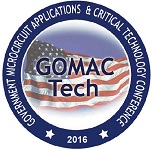We are continuing to publish our research on the use of Game Theory to optimize hardware Trojan detection processes in our paper at IEEE HOST 2016. Make sure to come by and chat with us!
-----
Trust Games: How Game Theory Can Guide the Development of Hardware Trojan Detection Methods
Jonathan Graf
Abstract: The development of circuit testing and verification methods is commonly driven by formal analysis centered on an abstract mathematical model of the error or defect the method is designed to detect. Hardware Trojans, however, confound attempts to develop simple representative models due to the varieties of their physical embodiments in a circuit and the creative nature of a rational human adversary. Since it is nonetheless desirable to have a mathematical framework for determining the effectiveness of hardware Trojan detection methods, we present a game theoretic framework for so doing. Modeling the Trojan maker and detection method designer as opposing players in a 2-person strategic game is a necessary step in our process. However, the ultimate utility of the approach depends on an accurate security economic model of both players that can correctly consider the players’ incentives, empirically-derived detection method efficacy metrics, a comprehensive taxonomy of hardware Trojans, and the places in the design cycle of the circuit where the Trojan insertion and detection occur. In this paper, we present such a security economic model and the resulting game, which we call the Trust Game. We illustrate the value of this game primarily in the context of how it may guide the development of new hardware Trojan detection methods. We solve a representative game, illustrating the value of two common solution concepts, the iterated elimination of dominated strategies and Nash equilibrium. We further show that this framework has utility to both of the opposing players in the game. Finally, we recommend the development of standardized Trust Games that can be used to quickly measure the efficacy of both new hardware Trojans and hardware Trojan detection methods.






